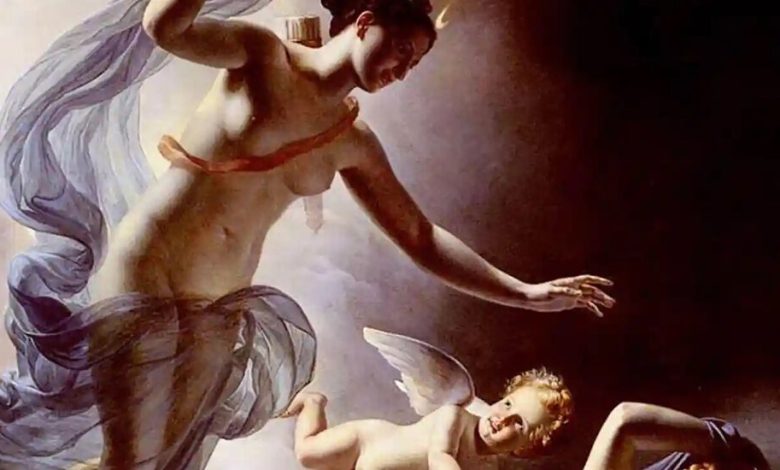A French City Appeals to Madonna for Clues About a Long-Lost Painting

A small city in northern France is turning to an unlikely source in an effort to reclaim a painting that it lost more than a century ago: Madonna.
In 1872, the Louvre lent the painting, “Diana and Endymion” by Jérôme-Martin Langlois, to the Picardy Museum in Amiens, France, where it remained until disappearing at some point by the end of World War I.
On Monday, the mayor of Amiens, Brigitte Fouré, said in a video that she recently learned Madonna owned a painting that looked just like the missing one.
While acknowledging that Madonna is probably unfamiliar with Amiens, Ms. Fouré nevertheless claimed a “special connection” between her city and the pop star. She went on to suggest that the painting that disappeared from the Picardy and the painting belonging to Madonna were one and the same, a possibility that art experts, including the museum’s current curator, have discounted.
In the video, Ms. Fouré asked Madonna if she would consider loaning her painting to Amiens to coincide with the city’s bid to be named a 2028 European Capital of Culture, an initiative devised to highlight the cultural diversity of Europe.
In her appeal, Ms. Fouré glossed over a few holes in her hypothesis, including the fact that Madonna’s painting is three centimeters shorter than the lost painting. And unlike the Picardy version, Madonna’s painting does not have a signature from the artist. (“Maybe it was cut?” the mayor surmised later.)
According to Le Figaro, Madonna, the highest-charting female musician in history, bought the painting from Sotheby’s in October 1989.
“We only wish that the inhabitants of Amiens can see again the painting which disappeared during the First World War,” Ms. Fouré said.
Representatives for Madonna did not respond to requests for comment. A spokeswoman for Sotheby’s, Mitzi Mina, said that the painting it sold in 1989 was described as a replica and that the original “Diana and Endymion” was destroyed during an air raid in 1918. She declined to comment on who bought the painting, but said that it sold for $440,000.
Before offering products for sale, Ms. Mina said, Sotheby’s conducts extensive due diligence to ensure its pieces are authentic and have no legal obstacles. “In the course of this, we check against all available records of lost or stolen art and regularly consult the leading experts in the field, as was the case in this instance,” she said.
The Picardy Museum, built between 1855 and 1867, was the first building in France that was specifically designed to be a fine arts museum, and its collection today includes archaeological artifacts from prehistoric sites, sculptures and contemporary art. Five years after the museum opened, in 1872, the Louvre lent “Diana and Endymion,” a neoclassical work that was commissioned in 1817 and delivered in 1822, to the Picardy, François Séguin, the museum’s curator, said.
At some point after that, the painting disappeared. Mr. Séguin said the painting was not included in a museum catalog in 1911, though it may have been rolled up in storage and not on display.
Others said the painting’s disappearance most likely occurred during an aerial bombardment in March 1918, when a torpedo hit the museum. The attack caused extensive damage to the building and its artwork, but “Diana and Endymion” is not included in the list of works that were destroyed in the bombings. Others said the piece was lost when the artwork that had been moved to safety during World War I were returned to the museum.
“The work could have left the museum without being truly destroyed before or after the bombardment,” Mr. Séguin said.
Despite Ms. Fouré’s claim, Mr. Séguin said there was no evidence to suggest that Madonna’s painting is the same one that was lost.
He said curators at the Louvre and the Picardy had known about the painting now owned by Madonna since 1988, when it was exhibited at the Bailly Gallery in Paris. At the time, experts at the Louvre concluded that the piece, which unlike the Amiens piece was unsigned and undated, was not the same as the piece that was missing.
“This is why the painting was able to cross the Atlantic, to be sold in New York and then acquired by Madonna,” Mr. Séguin said. He added: “If there was any doubt about the version kept by Madonna, it would be up to the Louvre to carry out any investigations. The Amiens museum is only a depository.”
Ms. Fouré said in an interview that her goal was to give the people of Amiens a chance to see the missing work. Even if Madonna’s painting was not the same as the missing one, Ms. Fouré said she expected that residents would be moved by the experience of seeing it in person.
Ms. Fouré acknowledged that it was somewhat unimaginable that a superstar like Madonna, who is performing in Paris in November as part of a global tour, would make a trip to Amiens, a city with a population of 134,000.
But she is hopeful: “I would be very honored to welcome her with the painting.”
